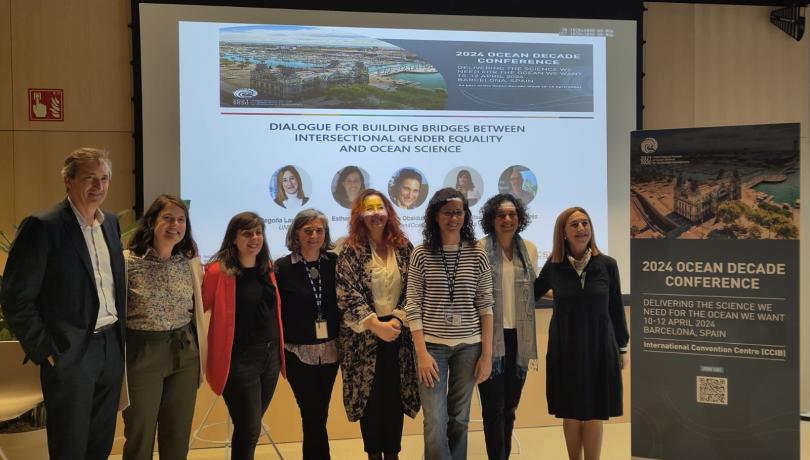Last April, during the UN Ocean Decade Conference in Barcelona, the ICM organised an event to set out a joint vision for ocean science from a gender perspective.

Last April, the Ocean Decade Conference took place in Barcelona. The UN Decade of Ocean Science for Sustainable Development (2021-2030) (‘the Ocean Decade’) seeks to stimulate ocean science and knowledge generation to reverse the decline of the state of the ocean system and catalyse new opportunities for the sustainable development of this massive marine ecosystem.
Under its vision of ‘the science we need for the ocean we want’, the Ocean Decade provides a convening framework for scientists and stakeholders from diverse sectors to develop the scientific knowledge and the partnerships needed to accelerate and harness advances in ocean science to achieve a better understanding of the ocean system and deliver science-based solutions to achieve the 2030 Agenda.
The Ocean Decade, in its articulation with the 2030 Agenda and concerning “Sustainable Development Goal 5: Achieve gender equality and empower all women and girls”, appoints to the need to increase gender equality in ocean science.
Women and the Ocean Decade
The ICM and UN ETXEA, in the framework of the Conference, led the organization of the event “Dialogue for Building Bridges between Intersectional Gender Equality and Ocean Science: A Multidisciplinary and Multisectoral Approach”, an open space for dialogue to define a joint vision of ocean science from a gender perspective, emphasizing the importance of including women at all levels and recognizing their contributions.
We understand that the need for gender equality goes beyond the ocean science community and it should transcend stakeholders from diverse sectors, as women outside the scientific fields also contribute to the knowledge and sustainability of the oceans. The production of scientific knowledge related to the oceans must take their voices and needs into account. At the same time, it should also be considered the inclusion of gender dimension in the production of knowledge in ocean research to guarantee that women also benefit from ocean science knowledge and results.
Deepening the Barcelona Statement arising from the conference and that emphasizes cross-cutting issues that must be addressed to ensure the success of Ocean Decade -including measures to continue to enhance diversity, inclusivity and equity -, ICM and UN ETXEA formulated "Recommendations for Promoting Gender Equality in Ocean Science" as a result of our Dialogue.
The key focus of these recommendations is on ensuring gender equality as a cross-cutting issue in the challenges, strategies, and actions of the Ocean Decade, and also joint action, encouraging the active participation of the international community, academic institutions, the private sector and civil society organizations in promoting gender equality in all ocean-related fields. Transdisciplinary approaches with collaboration between different sectors and stakeholders will improve ocean governance outcomes.
It is highly recommended to address gender discrimination and harmful gender norms from an intersectional perspective, implementing policies and programs that eliminate discriminatory practices, and for that, it is needed to improve knowledge about gender gaps, enhance the collection of sex-disaggregated data and introduce gender-sensitive indicators in statistics.
It is also necessary to promote women's participation and leadership by removing barriers and promoting pathways for women's participation and leadership in ocean-related issues; intensify efforts to ensure that women scientists and women from different stakeholder groups effectively benefit from capacity building initiatives; create supportive spaces and networks for women where they can build and develop their ideas, share experiences and collaborate on different initiatives; to promote more inclusive, equitable, safe and respectful environments for all women by fostering diversity in networks and work teams; as well as provide quality educational opportunities, scholarships, mentoring programs, networking and funding opportunities for girls and young women in ocean science. All of these will require increased investment and funding by allocating more financial resources to women-led projects and those that promote gender equality.
The path is marked out, we have to walk it.